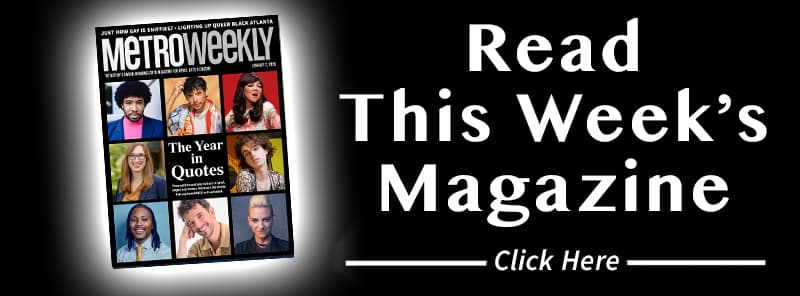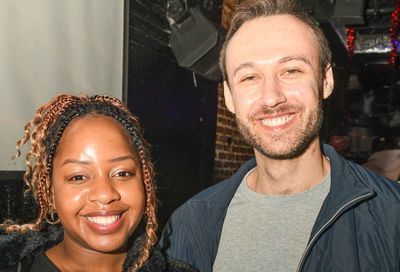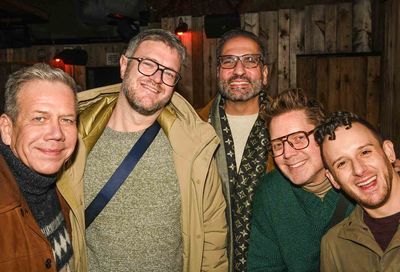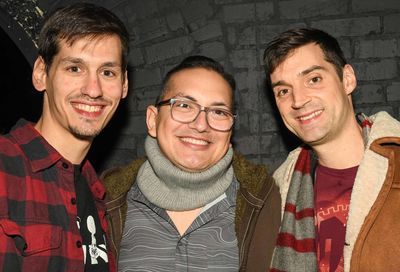A Man for All Seasons
Imam Daayiee Abdullah offers a gay Muslim's insights for the holidays
This time last year — as in other years past — there was a holiday-season ”smackdown.” Once again, voices on the right warned of the ”War on Christmas.” From Bill O’Reilly to the American Family Association, these culture warriors bemoaned the absence of the phrase ”Merry Christmas.” Less specific seasonal greetings left them cold.
Into the fray marched an unexpected voice: Imam Daayiee Abdullah, an openly gay Muslim from Washington, D.C. As a member of the National Gay and Lesbian Task Force Religious Leadership Roundtable, Abdullah penned a column that ran nationally in The Advocate, which was disseminated widely.
”Perhaps if the leaders of the religious right had the true Christmas spirit in their hearts, they would avoid insulting friends and fellow citizens with their insistence on public dogmatism, and spread some peace on earth and good will to all people,” he concluded.

This year, with the Christmas battlefield relatively quiet, a cheerful Abdullah took time from his day-to-day life of running his own foreign-language software company to speak with Metro Weekly. With an educational background in Chinese and Arabic languages, Middle Eastern studies, the Koran and law; extended periods of time spent in Beijing, Cairo, Damascus, Taipei, among other global spots; and decades of activism in the gay community, including moderation of an Internet group for gay Muslim men, there turned out to be quite a lot to talk about.
METRO WEEKLY: Were you raised a Muslim or did you convert to Islam?
IMAM DAAYIEE ABDULLAH: I was born to a Southern Baptist family. But my parents encouraged me. They always said one needs a religion, because we as human beings at some time in our lives need to call on something greater than ourselves. What you call it is not as important as having the connection, the spiritual liaison, so that you can survive the struggles in our lives.
As a child, 8 or 9 years old, I’d been to synagogue, Hindu temple, and a variety of different Christian denominations. I got exposed to a lot of things. My parents were very much about education, so we were exposed to the world outside. We traveled every summer, things like that, so we got to see what the world was really like. Then we could choose what we wanted to become in it.
MW: Were you raised in a large family?
ABDULLAH: Yes, I have six brothers and a sister who is the youngest, and then I have a half-sister who is the eldest from my father’s first marriage.
MW: Did you grow up in the D.C. area?
ABDULLAH: No, Detroit. I came here in 1978 for a conference. I was working for Gov. Jerry Brown’s (D-Calif.) office in San Francisco at the time. Then in 1979, I came for the [National March on Washington for Lesbian and Gay Rights]. I was one of the San Francisco coordinators, so I got here about a week beforehand and I had a chance to go out a little bit. After the march, I had another week of vacation so I stayed. And I said, ”Well, this is my Mecca.” I went back to [San Francisco] and two weeks later I decided I was going to move to D.C. About a month later, I was living here.
MW: When did you find your spiritual home, Islam?
ABDULLAH: While I was doing my tenure at Beijing University in the early ’80s, studying Chinese language and literature. Some of my classmates were Chinese Muslims from the Ãœrümqi area in far-western China. Through our conversations, study times, visits and dinners together, they asked me if I knew anything about Islam. I told them I had, in terms of what the Saudis had been teaching, but also the Nation of Islam. And they said, ”No, no, no — real Islam.” It piqued my interest. They invited me to go to the Beijing Mosque. That sparked my initial interest.
MW: When these fellow students spoke of ”real Islam,” were they talking about sects, like Sunni or Shia?
ABDULLAH: They never spoke in terms of a particular sect. [Their families] had been Muslim for over 1,100 years, by the trade that had extended itself through the Silk Route. That’s how Islam entered into China. That’s how they became Muslim. I would presume that they had a high Shia influence, but not necessarily so. It may have been a mixture of both. Those caravans were carrying people and their goods from all over the area.
MW: Looking at the differences of Shia and Sunni, is that just the surface? Is there far more differentiation, interpretation of Islam?
ABDULLAH: There are a lot of [controversies], but they came over time — particularly after the death of the Prophet. Afterwards, there was a group of men who came together as a council, so to speak. They chose among them a person who should lead them. When that happens, you’re always talking politics. After the Prophet’s death, everything became politics, because you have various tribes who are competing, and things of this nature. It’s like political parties.
Almost 20 years after the Prophet’s death, the issue of the Shia and Sunni schism sort of developed. So as the Prophet died, different things began filtering through. That started the historical schisms that separated the different groups. Just like in Christianity, you know? It’s people being human.
MW: When did people start calling you ”Imam”?
ABDULLAH: I can’t really say when that started. I presume it would have been sometime in 2000. When I joined [the online group, Muslim Gay Men], there were [online] discussions and some of the people who came in claimed that they were gay, but their purpose was to try to change people, versus understanding people for who they are. They would resort to ”ancient scholar so-and-so who such-and-such.” I would always challenge them because our belief is Koran first, then Sunna [the Hadith] of the Prophet. If we don’t find anything there, we go to what they refer to as the Sahaba [companions of Muhammad]. There’s nothing in the Koran that speaks against homosexuality. The Lut [a.k.a. Lot] story speaks about heterosexual men who use homosexual sexual acts as a form of punishment. When you read it literally, it says, ”men who turn away from their wives or mates.” Gay [men] don’t tend to have [female] mates unless it’s a cultural situation they’re forced into, by family or culture. During this same time, they had something they refer to as the mukhannathun — something like the hijras in India, sort of a male-female, cross-dressing types. They existed. And they also lived or worked in the household of the Prophet. Aisha, one of the Prophet’s wives, indicated that there were men who worked in the household. They were mukhannathun. That generally meant that they were not necessarily castrated, but not having an interest in women. If the Prophet had mukhannathun in his household who served him and his wives, it seems that he wouldn’t have had an aversion to these people.
As a religious leader — knowing that he was a religious leader — I’m certain that if he had something to say about it, he would have. But as a religious leader and as a governmental leader, he never had a legal case that dealt with homosexuality. There are several Islamic legal scholars who supported that point. So if it’s not something he did, those Haddith — or stories about the Prophet — that came out later are fabrications.
MW: That would seem similar to Christianity, in that Jesus never seemed to say anything about homosexuality.
ABDULLAH: It’s similar to Christianity in that it’s a political move in order to maintain control over peoples’ lives. People like to nitpick to take the issue away from the real problems of how individuals live their lives in the peaceful way their particular book calls for. That’s what the issue really comes down to.
 Imam Daayiee Abdullah |
MW: When did you come to terms with your own sexual orientation?
ABDULLAH: I told my parents when I was 15. The way it worked in my household, when you graduated from high school, you were your own person. You started making decisions for yourself. I went to summer school every year, so at 15 I finished high school and went off to college. And at 15 I told my parents I knew that I was gay.
MW: What was the reaction from your family when you came out?
ABDULLAH: There really wasn’t a major shock per se. They asked the typical questions of the ’70s: ”Are you sure? Is it something I did?” I told them it was nothing they had done. I had known this for quite a period of time and that through my soul searching, as well as research, I felt there was nothing wrong with me. I loved men, and had since I was a young kid. When I was about 5 years old I knew there was something uniquely special about men.
MW: Did that sense of courage, of confidence, come from your parents?
ABDULLAH: Of course. My parents always told us to let them know first — that way, they would support us. But if we were to lie about things, then we couldn’t expect support. When we were very young, my father and mother had a rule for us: ”If you want to act like a criminal, we’ll treat you like one.” So if you did something you weren’t supposed to do, all your stuff was taken away — your toys, your privileges, all of that — and we learned very quickly that society is not going to put up with that. Also, my mother used to tell us ”I’m queen of this household. Your father is king and you are all young princes. And one day you’ll rule your own kingdom. So you must learn the proper rules of etiquette and behavior.” Both of my parents are deceased now, but it’s something that definitely makes me see that I had very good parents.
MW: The gay Muslim community, looking for religious leadership, does not have many people to turn to.
ABDULLAH: I agree.
MW: Is that why you became the imam, because you were giving advice to gay Muslims?
ABDULLAH: There were some gay Muslims who had died from AIDS and no one would do their Janâzah, their funeral prayer. Stepping forward to do those things put me in that position, rather than me seeking that position.
MW: You performed funeral services?
ABDULLAH: For one gay male who had died of AIDS-related illness. Then I did same-sex marriages, both for women and men. Then counseling for Muslim men and women who have had problems with their families.
MW: You have performed wedding ceremonies for two Muslims of the same sex?
ABDULLAH: Yes, I have. And mixed marriages as well — both gay and straight. I’ve married Muslim and Jewish, and Muslim and Christian. I have a particular belief that since we’re all sister religions, we’re all part of the Abrahamic faith, that within the Koran itself it says that we can interact with each other, marry with each other. But because of the way some people have read the Koran and interpreted it, they have misconstrued information within the Koran because they are not [considering] when certain things came about.
When the revelations came, it was on a timeline. But the Koran is more by categories, if you will, or subject matter. So things that may have happened over the 22 years [of Mohammed’s revelations] are somewhat accumulated together on certain subjects, so they confuse issues. [For example,] when Islam was developing, hatred was expressed towards them, some of the members were murdered, some were beaten. Their society was attacked, their economic stability was attacked, because people wouldn’t patronize them. That’s when the revelation came that you should fight back because these people’s hearts are sealed. They are not going to ever change towards you. So fight back and protect yourselves.
When you pull this historical information together and when the Koran was finally compiled, you have all these things put in together. Now some people use the terms that some rules were abrogated. Others said there was never abrogation. So some of the rules, they don’t know when they were used and when they were ended. And with other ones, they say it started here and ended here.
Part of the Koran’s message says that it came to correct innovations that were made in the Judaic and Christian religions, so many of the stories are the same. But some of the facts and things around the edges aren’t necessarily there or there’s something slightly different.
The mainstream Islamic community uses [the destruction of Sodom story] to say that homosexuality is not a permissible form of sexual interaction. I believe that they are very incorrect about that because the Koran does speak allegorically and very clearly that sex is an important aspect of each human being’s life, in that a man and a wife both have responsibilities and rights — and rites — involved in their sexual relationships.
The Koran does not say that same-sex individuals should not have loving relationships. In the allegory they say that you should have your ”protector and your cloak.” Your protector being someone who provides for you — be it your housing, your food or [physical protection]. And in your ”cloak,” meaning there’s someone who is your sexual intimate. Therefore, when it says that — and not in terms of male and female, but in terms that people should have that — that’s the broader understanding.
If people were able to get their brains around that, it’s a better understanding because God is not so specific. God is much bigger, because when God gives us something he gives us diversity. If you take a flower like a carnation, you have miniatures, standards and large, but they’re all carnations. Why is it that God provides us diversity in it? Yet when it comes to human sexuality, there’s only one thing. That goes against the very universal rulings of God, and there’s only one thing that Allah says or God says to us: We should worship no one other than God. That’s consistent throughout. Everything else is how people interpret it, and how God’s mercy will be given to us.
MW: Then what is your understanding of God and homosexuality?
ABDULLAH: My understanding is that how we treat each other in our relationships is based upon the kind of person you are. How do you treat your mate? Are you cheating on them? Those types of things are very important. I think our problem in the gay community is that we’ve been so accustomed to having no regulations. Go to bars, have free sex — it happened in San Francisco in the 70’s, I know what people did. All those things were treating people sexually as objects.
We should never treat each other as objects, but yet that’s part of the gay community. I think we’ll be held accountable for that no matter what your faith or anything. As gay people, we’ll be held accountable. Why did you treat that person as an object rather than a loving, caring individual? I think God judges us on how we interact with people. What is your intention in how you’re dealing with people? If your intention is to ”have” that person as a sexual object, then you’ve turned that human spirit into an item, an idol if you will, that’s supposed to be lifeless and soulless.
MW: In a loving, same-sex relationship, sex is allowed then?
ABDULLAH: Yes. I believe so. Because the Koran says that we should have good sexual relationships.
MW: Do you have a partner?
ABDULLAH: Yes, of 10 years.
MW: Is he Muslim as well?
ABDULLAH: No, actually he is Christian. This is one reason why I do interfaith marriages. When God puts people together and they find love with each other, who am I to say it’s not possible? If the two people can find love with each other, then why can’t I support that?
Although I’ve done several same-sex marriages, I’ve done more [mixed-faith] heterosexual marriages. [These couples] would look for someone who thought outside the box — the community is asking for this.
This takes us back to last year in the article. Why can’t I say to my Jewish friends whom I’ve known for a number of years, ”Happy Holidays,” and for them to know that I’m wishing them a happy Jewish holiday? And with my Christian friends, to be able to say to them, ”Happy Holidays”? And to my African friends, [celebrating] Kwanzaa and various other [holidays], I can say to them also ”Happy Holidays.” And to my Muslim brothers as well.
A few years ago, all the holidays fell together right in that Thanksgiving-Christmas period. I found that was one of the most peaceful times here in the United States, because everybody was celebrating and not paying attention to whether they’re better or we’re better.
MW: You said you know of one other openly gay Imam in the world, in South Africa.
ABDULLAH: Yes, his name is Muhsin Hendricks.
MW: Do you confer with him?
ABDULLAH: Oh, yes. We’re very good friends. I’ve been to South Africa. They had a conference two years ago and they invited me to speak. It was dealing with being gay and Muslim, and also how we find a sense of who we are. One of the problems that’s always associated with the Muslim faith — and sometimes mirrored in other faiths — is that homosexuality is all based on sex, the sexual act. It’s not based upon one’s orientation. If you don’t have sex, you can still have a gay orientation. So the issue is not really about sex. It’s about how people interpret the way in which they are able to love another individual. That’s one of the things I try to stress with parents, with other people who are non-gay but also Muslim.
MW: In America today, do you think it’s easier to be gay or to be Muslim?
ABDULLAH: It’s on the spectrum of different things. If you’re not heterosexual, you’re on the other side of the equation. When I was at Georgetown [University], there were people from all around the world. When South Africa was doing apartheid, I knew black South Africans and white South Africans. I would talk to both of them. But I also came to realize, too, that in the spectrum of things, some people would like me because I’m black, and some wouldn’t. Some people like me, or not, because I’m gay.
Being a black man in white, gay society, I’ve grown greatly accustomed to this diversity, being the ”other.” When I walk down P Street or Christopher Street or Castro Street, I’m that black man — not necessarily ”my black gay brother.” When they find out I’m Muslim, or that I’m a former lawyer, or that I like to play pinochle, or that I like pistachio ice cream, they may still not like me.
MW: And in the Muslim community?
ABDULLAH: Whenever I go to places for prayer, in most places I’m not harassed. People know who I am. I think that shows the quality of those Muslims in those particular centers. However, I have had others who wanted to attack me. I’ve told them, ”Be my guest if you want to do so, but I assure you I will go to the full extent of the law to have you put in jail or sent back to where you came from.” Plain and simple. I’ve been the topic of discussion for years now, so it’s not like it’s something new.
MW: Do you have a holiday message for Metro Weekly readers?
ABDULLAH: Let us let go of our fear of each other and fill that space with happiness. Knowing someone different is a blessing. I would like for the gay community to better understand that it’s going to improve its position by being more knowledgeable about other peoples’ positions. In return, [the gay community] can ask that [others] become more knowledgeable about their position. Through that exchange, you find common ground.
Support Metro Weekly’s Journalism
These are challenging times for news organizations. And yet it’s crucial we stay active and provide vital resources and information to both our local readers and the world. So won’t you please take a moment and consider supporting Metro Weekly with a membership? For as little as $5 a month, you can help ensure Metro Weekly magazine and MetroWeekly.com remain free, viable resources as we provide the best, most diverse, culturally-resonant LGBTQ coverage in both the D.C. region and around the world. Memberships come with exclusive perks and discounts, your own personal digital delivery of each week’s magazine (and an archive), access to our Member's Lounge when it launches this fall, and exclusive members-only items like Metro Weekly Membership Mugs and Tote Bags! Check out all our membership levels here and please join us today!























